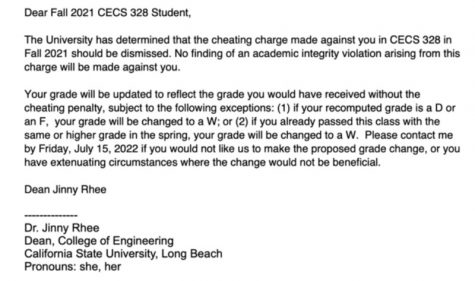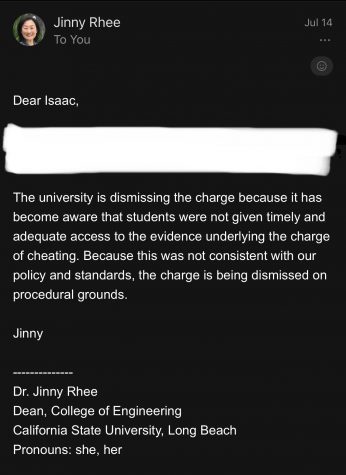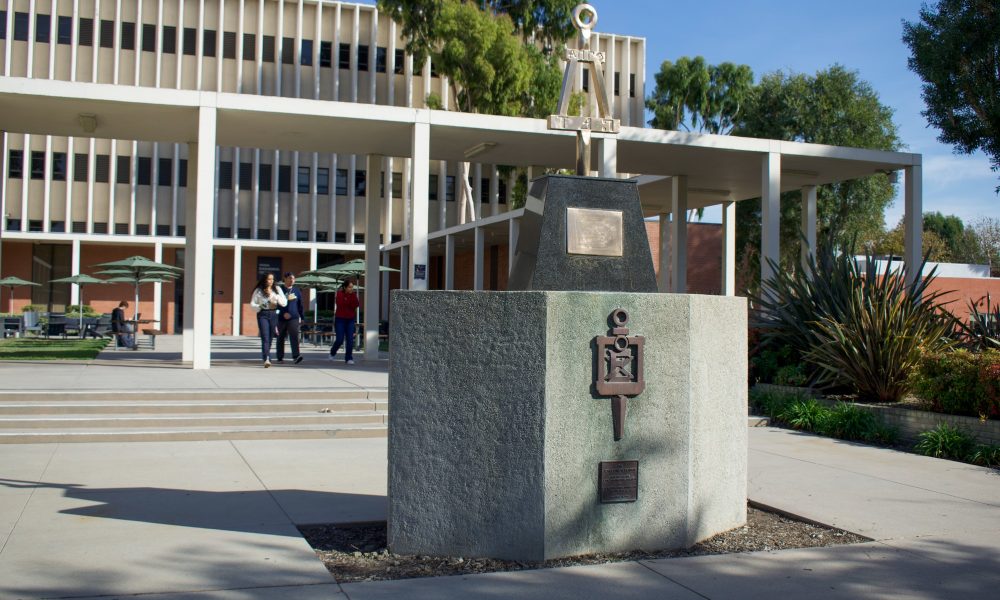Long Beach State computer science students who were accused of cheating during the online 2021 fall semester, succeeded in their grade appeal and any cheating penalty on their record was dismissed.
Jinny Rhee, CSULB Dean of the College of Engineering, emailed students who were in the CECS 328: Data Structures and Algorithms course during fall ‘21. She wrote in the email that their cheating accusations were dismissed “for procedural reasons” and changed to reflect the grade they would have received without the cheating penalty.
Approximately 50 students were accused of plagiarism in the course.

However, they were denied monetary compensation or a refund for the course.
The College of Engineering dean said she is working with the Academic Senate Executive Committee to ensure the incident does not happen again.
Computer science professors Darin Goldstein and Ali Sharifian accused their students of plagiarism, after an AI [artificial intelligence] recognized similarities in their codes.
The students argued that it was impossible for them to cheat off each other since the semester was online and they did not know anyone in the course. Other students argued that each student was given the same assignment and had the same level of coding knowledge, so their codes being similar was coincidental.
Mark Fastner, a CSULB computer science major, was one of the students accused of academic dishonesty. He and 13 of the students accused filed to have their grade appealed.
After exhausting other options through the grade appeal processes, Fastner hired a lawyer to speak with Shawna Mckeever, university counsel for CSULB, during the summer.
“Once my lawyer, Judith Mcaulay, spoke with Shawna McKeever the situation was resolved very quickly,” Fastner said. “Shauna convinced my lawyer to not file a lawsuit yet and to give them a little bit more time because university officials were not aware of the situation.”
Fastner said he was annoyed, because Rhee had informed him that university executives were aware of the situation and the students had been fighting for an appeal for months.
Two weeks after their initial conversation, Mcaulay spoke with McKeever to remind her of the impending suit. Then, the university counselor informed her that the grade appeal would be accepted, and everyone would have their grade changed.
Isaac Rodriguez, a CSULB computer science major, was also accused of plagiarism. When he received his grade change, Rhee emailed him admitting that “students were not given timely and adequate access to the evidence underlying the charge of cheating.”

Despite the victory, Fastner is concerned for other students who took or will take the course and is encouraging the college to change the grade appeals process so it does not treat students as “guilty until proven innocent.”
“The process does not allow students to verbally communicate with the committee and only allows one appeal to be submitted, which they did not read,” Fastner said. “The committee members need to be 100% sure without a shadow of a doubt that plagiarism has occurred in every specific case before they send out their decision.”
Fastner also argued that part of the issue was Professor Darin Goldstein, who he said was not transparent with students about their cheating accusation.
Goldstein is tenured at CSULB, but he is not teaching during the fall ‘22 semester.
“The department needs to make sure professors don’t have this overreaching power in academic integrity proceedings,” Rodriguez said. “There also needs to be protections for students to defend them from these predatory blanket procedures in the name of preventing cheating.
In an email, Dean Rhee said she and the Academic Senate Executive Committee are making updates to the Academic Integrity and Grade Appeals policies.
“We’ve also just elected an ad-hoc committee in the College of Engineering to develop college-specific guidelines for reducing and handling academic dishonesty,” Rhee wrote. “Engineering ethics is a tenant of our profession and is listed as a priority in the college Action Plan in response to Beach 2030.”
Fastner was aware that students from spring ‘21 and spring ‘22 were also accused of academic dishonesty, but they did not receive a grade change. He encouraged them to engage in discussions with the college of engineering if they insist on their innocence.




